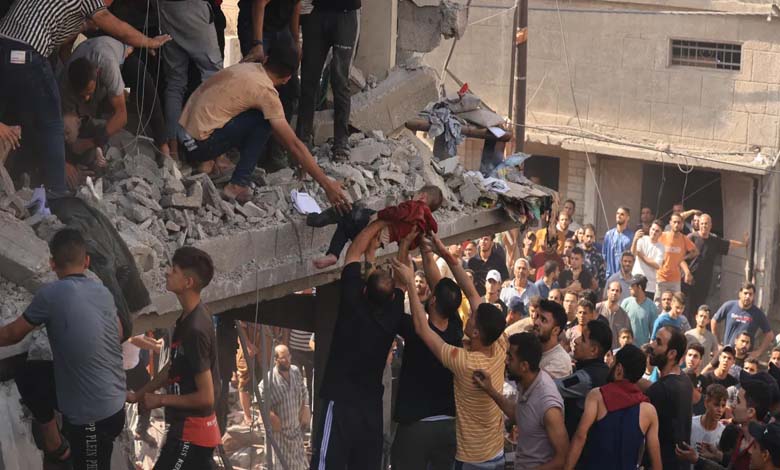Three scenarios closing in on Gaza after the war

As Israel continues its military operations to seize control of Gaza City, debates are intensifying in Tel Aviv and Washington regarding the future of the enclave once the war comes to an end.
-
Hostages or Gaza’s Occupation: What Is Netanyahu’s Priority?
-
Netanyahu calls for accelerating the takeover of Gaza despite warnings
The future of Gaza appears trapped between sharply divergent scenarios: a long-term Israeli occupation, an international administration fraught with obstacles, pressures toward population displacement, or reconstruction under strict conditions.
According to the British newspaper The Times, U.S. President Donald Trump held a meeting to review possible scenarios, while official U.S. estimates suggest that the fighting could stop within weeks or before the end of the year.
Yet the central question remains: how will Gaza’s future be shaped?
-
Gaza Occupation Plan Takes Final Shape Despite Truce Talks
-
Latest News from Gaza: Intensified Israeli Bombardment and Tanks Advancing to the City’s Entrance
Long-term occupation
Israel’s current plan focuses on extending its control northward to Gaza City, effectively placing most of the territory under direct military rule.
Although Israel already controls all of Gaza’s land crossings, it intends to retain wide areas as “buffer zones” even after the fighting subsides.
Historical precedents in South Lebanon and the Golan Heights suggest that such a military presence could last for years, bringing with it serious security challenges, political costs, and mounting public resentment.
-
The largest since the start of the Gaza war… The People’s Strike paralyzes Israel
-
Occupation of Gaza Plan… Israeli Estimates Suggest Fighting Could Last Until 2026
Humanitarian tragedy and risks of displacement
Alongside military strategy, Gaza’s 2.1 million residents face catastrophic humanitarian conditions.
The Israeli offensive in the north has forced tens of thousands to flee southward, where the population density has reached levels described as resembling a “mass detention camp,” according to the report.
While Israel presents leaving Gaza as a “voluntary” option, the lack of alternatives and the destruction of infrastructure push the situation closer to forced displacement.
-
Israeli army approves guidelines for Gaza offensive
-
Gaza Sparks a Civil Servants’ Revolt in the European Union
This vision echoes a previous proposal by Donald Trump to resettle Gaza refugees in Arab countries and transform the enclave into a tourist area under U.S. management.
However, Cairo, Riyadh, Amman, and other Arab capitals have rejected this plan, stressing that the only alternative is reconstruction while ensuring Palestinians remain on their land.
The international forces option
Another idea, supported by some Arab and Western actors, would be to deploy an international force under a U.N. Security Council mandate to secure Gaza, alongside the creation of a new local administration excluding Hamas but involving the Palestinian Authority.
-
Israeli Army Preparing to Occupy Gaza City with a Quarter Million Soldiers
-
Israel’s Plan to Seize Control of Gaza: Seven Questions Answered
The Authority has already held talks with Hamas on forming a technocratic government.
Israel, however, firmly rejects any return of the Palestinian Authority or remnants of Hamas influence. Deploying an international force would also face immense logistical and political hurdles, as well as significant security risks for participating states.
Temporary truces without a peace horizon
The war has witnessed intermittent ceasefires, during which hostages and prisoners were exchanged. Yet none of the longer-term truces have endured, due to the irreconcilable conditions of the parties.
-
After Gaza: Questions over the Fate of Al-Mawasi and the Crowded Central Camps
-
Growing international opposition to Israel’s plan to occupy Gaza
Israel rejects any “partial deal” that does not include the release of all hostages, while Hamas insists on linking any agreement to an end of the war.
The most likely outcome remains a new temporary truce, providing a short respite but no guarantees for lasting stability.
The two-state solution… a dying idea
Politically, the prospect of a two-state solution is becoming increasingly remote. The Israeli government and the Knesset firmly reject the creation of a Palestinian state, even as settlement expansion in the West Bank continues.
-
How the Muslim Brotherhood Serves Netanyahu Under the Guise of Solidarity with Gaza
-
Thirst Deepens the Suffering of Gaza’s Residents
Nevertheless, some powers, such as France and Saudi Arabia, are seeking to revive the debate through the United Nations. At the same time, several major Western countries have moved to recognize Palestine, a step Israel considers a “reward for Hamas.”
Growing international isolation
Since October 7, 2023, the war has resulted in the deaths of more than 62,000 Palestinians, according to Gaza authorities, including doctors and journalists, while the United Nations has declared famine in the enclave.
-
From the Battlefield to the Therapist’s Office: Gaza Haunts Israeli Soldiers Without Firing a Bullet
-
Stop the Unjust War in Gaza: A Message from 550 Former Israeli Officials to Trump
This reality has significantly eroded traditional support for Israel: the United Kingdom suspended free trade agreement talks and imposed sanctions on hardline ministers; Germany and Australia adopted more critical stances; and the International Criminal Court issued an arrest warrant against Prime Minister Benjamin Netanyahu and other Israeli officials on charges of war crimes.
Even so, U.S. political and military backing remains Israel’s primary safeguard for continuing on its current path, even at the cost of deeper global isolation.
-
Signed by Over 100 Journalists: International Petition to Break Gaza War Blackout
-
Diaries of a Gaza family: waking up hungry and sleeping on broken hope
The newspaper concludes that Gaza’s future appears surrounded by contradictory scenarios: long-term Israeli occupation, a troubled international administration, pressures for displacement, or reconstruction under conditions.
What is certain, however, is that any settlement will remain hostage to the balance of power on the ground and to regional and international rivalries that keep every outcome on the table.












